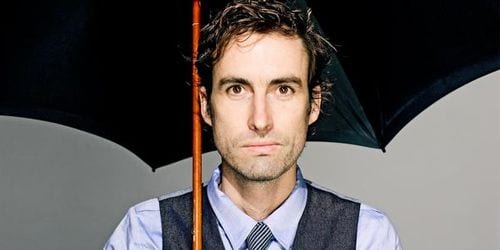
Andrew Bird is mesmerizing, like a stir of echoes. It’s hard to pinpoint just what makes him that way, keeps him so appealing both because of and in spite of that, and continues to put him squarely under the microscope of ongoing critical scholarship — the kind of depth in a body of work that’s manna for critics both erudite and rote, effusive fans and longwinded bloggers everywhere. It has something to with temperance and humility. He comes off so quietly confident, yet enchantingly humble, even at his most pretentious moments. Arrogance probably doesn’t elude him, but it eludes his stage persona. And yet, he’s not aloof, either; Bird is well aware of his significant charms and above all, strengths as a songwriter. You’ve read the interviews; you know how obsessively he worked to make a proper body of work that includes at least three A-level albums and one (2005’s The Mysterious Production of Eggs ) that’s unimpeachably great. That Bird makes his best shows a balance of refined folk-rock and beautiful, sometimes ethereal, chamber pop isn’t an accident, either. (Many singers and multi-instrumentalists whose music depends on dynamics like Bird’s effect a great stage presence on charisma alone; Bird would have the material, the whistling, the violin, and the guitar virtuosity regardless of how comfortable he felt up there.) No, maybe what gives him the edge is that he’s so interested in his own music — and exudes a straitlaced, responsible confidence that suggests to an audience “here’s what I have to offer you, I have worked on it with great pains, I’m convinced of its ability to be better and more interesting than 99 percent of what else you’re listening to, and I’m convinced of my ability to be able to convince you.” It’s beguiling, this approach; Bird sings his songs like he expects to find newness in them every time, hits notes and delivers phrases like he hopes they’ll be even more revealing, occasionally gets lost in his own fog — those loops get dense — but knows that by peeling back the layers of those loops and returning to a single pluck, strum, whistle or breathy chorus, he’ll resolve everything. At the Music Hall of Williamsburg, where he turned up fairly last minute to warm-up for a highly regarded gig at Carnegie Hall a few nights later, Bird proved that when necessary, he can add one more highly desirable quality to his performances: Occasional glibness. It was needed, for sure — at the very least, to lighten the room, which was heavy with Bird’s seriousness and the fidgety tension of an audience that was expecting some new songs, but maybe not quite so much, and all at once. The crowd skewed occasionally irritating, if not quite disrespectful; when it was clear Bird would be doing so much of Noble Beast and that, well, was going to be how it was going to be, a gentle persuasion to do otherwise every few songs became obstinate. “I didn’t know this was an open call for conversation,” Bird chuckled at one point. “Shut up” in other words — but in humble, good-natured tones. The way Andrew Bird might have said it — not in person, but on stage. Bird and a three-piece band — his usual compatriot Martin Dosh on drums plus Michael Lewis on bass and Jeremy Ylvisaker on guitar (and for a moment, clarinet, and even saxophone) — leaned heavily into Noble Beast, as if dipping it, like an enormous sponge, straight into audience expectations, picking it up, wringing it out and seeing what was left. They’re classic Bird, really: “Nomenclature”, “Masterswarm”, “Not A Robot, But a Ghost”, “Anonanimal”, “The Privateers” — poesy about the world’s oddities (and Bird’s sometimes enamored, sometimes frustrated, sometimes resigned attempts to apprehend those oddities) that leans over a line between literate pop and brutally high-minded Ph.D. writing workshop without completing the tumble over that line. In that sense, it was a go-for-broke show; the strength of Bird’s new material would sink him or make the night, and with him, you can’t lean on familiarity like “Fake Palindromes” (the first back catalog touchpoint of the night and the eleventh song he played) because every single song with Bird is its own little world. That is to say, it’s a massing of moods, effects, narratives, and ambience so heavy and layered, that if it’s great you feel it pulse and be great, and if it’s a plod you still have those effects to fall back on, listening to how the tones crest and blend. I’ve never quite understood the knock on Bird that he shrouds his work in too many sonic pilings — sure, there’s a lot going on and so much of it can seem pre-engineered, but there’s something to be said for such dense, inviting composition that never sounds like background noise and doesn’t give into fuzzy, free-jazz noise blotching to create some semblance of “sound collage” (when what’s really happening is an attempt to hide a lazy melody). Yes, there’s so much going on — I can’t say that Ylvisaker, Lewis or even Dosh is wholly necessary on every tune — but you can hear everything. You can hear all the parts at work, understand they all have a purpose, if it’s not always a needed addition, and in the center is Bird’s rich tenor, lilting whistle or alternately piercing, alternately melancholy violin or guitar tones — implied conductors in a voluminous sonic orchestra.

![Call for Papers: All Things Reconsidered [MUSIC] May-August 2024](https://www.popmatters.com/wp-content/uploads/2024/04/all-things-reconsidered-call-music-may-2024-720x380.jpg)



